1. Overview
Omar Bongo Ondimba, born Albert-Bernard Bongo on January 30, 1935, was a Gabonese politician who served as the second President of Gabon from 1967 until his death on June 8, 2009. His presidency, spanning 42 years, made him one of the world's longest-ruling non-royal leaders. Bongo's political trajectory began in the 1960s under Gabon's first President, Léon M'ba, where he quickly rose through key positions, eventually becoming Vice-President in 1966 and succeeding M'ba upon his death in 1967.
Initially heading a single-party regime under the Gabonese Democratic Party (PDG) until 1990, Bongo was compelled to introduce multi-party politics due to mounting public pressure. Despite intense opposition in the early 1990s, he maintained political dominance by skillfully co-opting major opposition leaders. His re-elections in 1993, 1998, and 2005 were often controversial, but he consistently secured increased parliamentary majorities, leading to a more subdued opposition over time.
Bongo's governance was characterized by a distinctive, often authoritarian, "African Big Man" style, heavily reliant on patronage networks and personal rule. While his leadership provided a degree of stability for Gabon, preventing coups and civil wars in a volatile region, it also faced significant criticism. Critics accused him of prioritizing his personal wealth, family, and local elites over the welfare of the nation, leading to widespread allegations of corruption, misappropriation of state resources, and a lavish lifestyle. Despite Gabon's considerable oil wealth, the country saw limited infrastructure development, persistent social inequality, and high infant mortality rates. Human rights organizations consistently criticized the curtailment of press freedom and suppression of political dissent under his regime. His close and enduring relationship with France, often termed "Françafrique," was a cornerstone of his foreign policy and a source of both support and scrutiny.
Omar Bongo's death in 2009 led to his son, Ali Bongo Ondimba, succeeding him, extending the family's hold on power. His legacy remains complex, marked by a period of sustained peace and the development of a rentier state economy, alongside significant critiques regarding democratic principles, human rights, and the equitable distribution of national resources.
2. Early Life and Background
Omar Bongo's formative years and early career laid the groundwork for his eventual rise to power, characterized by a rapid ascent through public service and military ranks.
2.1. Early Life and Education
Born Albert-Bernard Bongo on January 30, 1935, in Lewai, a town in the Haut-Ogooué province of what was then French Equatorial Africa (now southeastern Gabon), he was the youngest of twelve siblings. Lewai was later renamed Bongoville in his honor. Bongo was a member of the small Bateke ethnic group. His education began in Brazzaville, then the capital of French Equatorial Africa, where he completed his primary and secondary schooling. In 1973, he converted to Islam while on a visit to Libya and adopted the name El Hadj Omar Bongo. On November 15, 2003, he added Ondimba as a surname in recognition of his father, Basile Ondimba, who died in 1942.
2.2. Early Career
After his education, Bongo began his professional life at the Post and Telecommunications Public Services. He then joined the French military, serving in the Air Force as a second lieutenant and later a first lieutenant in Brazzaville, Bangui, and N'Djamena (then Fort Lamy). He received an honorable discharge as a captain. Following Gabon's independence in 1960, Bongo entered the political arena, rapidly advancing through various positions under President Léon M'ba. In the 1961 parliamentary election, Bongo campaigned for M. Sandoungout in Haut-Ogooué, who was elected and became Minister of Health. Bongo himself chose not to run for election. He worked for a period at the Ministry of Foreign Affairs and was appointed Assistant Director of the Presidential Cabinet in March 1962, becoming Director seven months later. During the 1964 Gabonese coup d'état, the only coup attempt in 20th-century Gabon, Bongo was held in a military camp in Libreville after M'ba was kidnapped. However, M'ba was restored to power within two days.
On September 24, 1965, Bongo was appointed Presidential Representative, responsible for defense and coordination. He was subsequently appointed Minister of Information and Tourism, initially on an interim basis, before formally holding the position in August 1966. As President M'ba's health declined, Bongo was appointed Vice-President of Gabon on November 12, 1966. In the presidential election held on March 19, 1967, M'ba was re-elected President and Bongo was elected Vice-President. By November 1966, Bongo was in effective control of Gabon due to M'ba's prolonged illness.
3. Political Career
Omar Bongo's political career was defined by his swift ascent to power and his remarkably long tenure as President of Gabon, marked by strategic political maneuvers and evolving governance structures.
3.1. Pre-Presidency
Bongo's rise was notably rapid. After serving in various administrative and military roles, he was appointed to key positions under President Léon M'ba, including Assistant Director and then Director of the Presidential Cabinet. In 1965, he became the Presidential Representative for defense and coordination, followed by his appointment as Minister of Information and Tourism. His increasing influence culminated in his selection as Vice-President in November 1966, a role he formally assumed after approval from French President Charles de Gaulle during a visit to Paris in 1965. This rapid advancement positioned him as the clear successor to the ailing M'ba. On March 19, 1967, he was officially elected Vice-President alongside M'ba.
3.2. Single-Party Rule
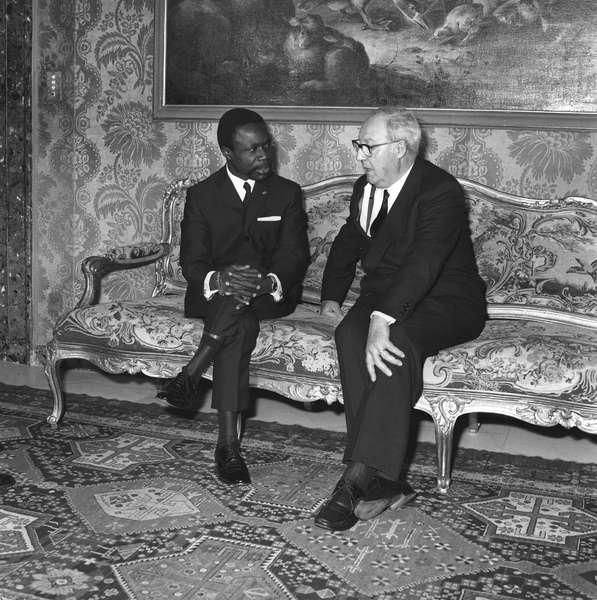
Omar Bongo became President of Gabon on December 2, 1967, following the death of Léon M'ba four days earlier. At 32, he was among Africa's youngest heads of state at the time. His ascension was actively supported by influential French leaders, solidifying the strong ties between Gabon and France. In March 1968, Bongo transformed Gabon into a single-party state, renaming the Gabonese Independence Party (Bloc Démocratique Gabonais, BDG) to the Gabonese Democratic Party (PDG). This move consolidated his political control and marked the beginning of decades of one-party rule.
In the 1973 elections, Bongo stood as the sole presidential candidate, and he and all PDG candidates were elected with an overwhelming 99.56% of the votes. In April 1975, Bongo abolished the post of vice-president and appointed his former vice-president, Léon Mébiame, as Prime Minister, a position Bongo himself had held concurrently with the presidency since 1967. Mébiame served as Prime Minister until his resignation in 1990. Beyond the presidency, Bongo held numerous ministerial portfolios from 1967 onward, including Minister of Defense (1967-1981), Information (1967-1980), Planning (1967-1977), and the Interior (1967-1970). Following a PDG Congress in January 1979 and the December 1979 elections, Bongo relinquished some of his ministerial portfolios and transferred his functions as head of government to Prime Minister Mébiame. The PDG congress had criticized Bongo's administration for inefficiency and advocated for an end to the holding of multiple offices. He was re-elected for a seven-year term in 1979, again with a near-unanimous 99.96% of the popular vote.
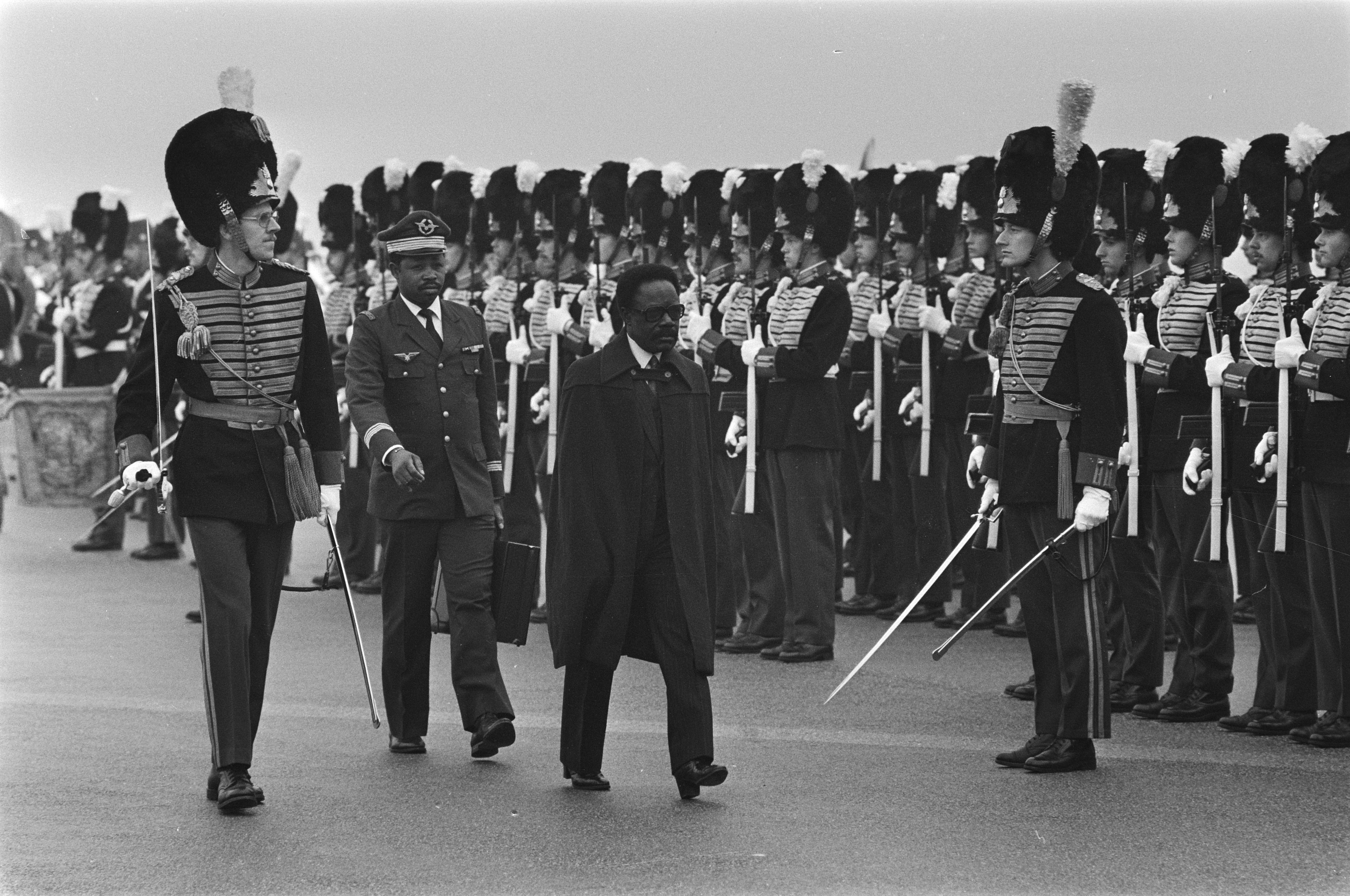
Opposition to Bongo's regime began to emerge in the late 1970s as Gabon faced increasing economic difficulties. The first organized, albeit illegal, opposition party was the Movement for National Restoration (Mouvement de redressement national, MORENA). This group organized student and academic staff demonstrations at the Omar Bongo University in Libreville in December 1981, which led to the university's temporary closure. MORENA criticized Bongo for corruption and personal extravagance, accusing him of favoring his own Bateke ethnic group and demanding the restoration of a multi-party system. In February 1982, arrests were made when the opposition distributed leaflets criticizing the regime during a visit by Pope John Paul II. In November 1982, 37 MORENA members were tried and convicted of offenses against state security, with 13 receiving severe sentences, including 20 years of hard labor. However, all were pardoned and released by mid-1986.
Despite these pressures, Omar Bongo remained committed to one-party rule. Legislative elections in 1985 followed the established pattern, with all nominations approved by the PDG, which then presented a single list of candidates ratified by popular vote on March 3, 1985. In November 1986, Bongo was re-elected again with an overwhelming 99.97% of the popular vote, reinforcing the appearance of an unchallenged political system.
3.3. Transition to Multi-Party Politics
The late 1980s saw growing demand for political reforms in Gabon. On May 22, 1990, after a period of strikes, riots, and widespread unrest, the PDG central committee and the National Assembly approved constitutional amendments to facilitate a transition to a multi-party system. These amendments stipulated that the existing presidential mandate, effective until 1994, would be respected, but subsequent presidential elections would feature multiple candidates, and the presidential term would be set at five years, with a limit of one re-election.
However, the transition was turbulent. On May 23, 1990, Joseph Rendjambe Issani, a prominent critic of Bongo and the secretary-general of the opposition group Parti gabonais du progres (PGP), was found dead in a hotel, reportedly murdered by poison. This event triggered the worst rioting of Bongo's 23-year rule. Presidential buildings in Libreville were set on fire, and French nationals, including the French consul-general and ten oil company employees, were taken hostage. A state of emergency was declared in Port-Gentil, Rendjambe's hometown and a crucial oil production site. During this crisis, Gabon's two main oil producers, Elf and Shell, drastically cut output. Bongo threatened to revoke their exploration licenses unless normal output was restored, which they soon did. France intervened with Opération Requin, sending 500 troops (some sources suggest up to 1,200) to reinforce its permanent battalion of Marines stationed in Gabon, ostensibly to protect the interests of 20,000 French residents. Tanks and troops were deployed around the presidential palace to quell the riots.
In December 1993, Bongo won Gabon's first presidential election under the new multi-party constitution, securing a narrow victory with approximately 51.4% of the vote. Opposition candidates refused to validate the results, leading to severe civil disturbances. These unrests prompted an agreement between the government and opposition factions, culminating in the Paris Accords in November 1994, which led to the inclusion of several opposition figures in a government of national unity. However, this arrangement quickly dissolved. The 1996 and 1997 legislative and municipal elections marked a return to partisan politics. While the PDG achieved a landslide victory in the legislative election, several major cities, including Libreville, elected opposition mayors during the 1997 local elections.
Bongo successfully consolidated power once more, effectively co-opting or financially influencing most of the major opposition leaders, many of whom were given high-ranking government posts. This strategy ensured his comfortable re-election in 1998. In 2003, Bongo secured a controversial constitutional amendment that eliminated term limits for the presidency and extended the presidential term from five to seven years. Critics widely accused him of intending to rule for life. On November 27, 2005, Bongo won another seven-year term, receiving 79.2% of the vote, significantly ahead of his four challengers. He was sworn in on January 19, 2006, and remained president until his death in 2009.
3.4. Relations with France
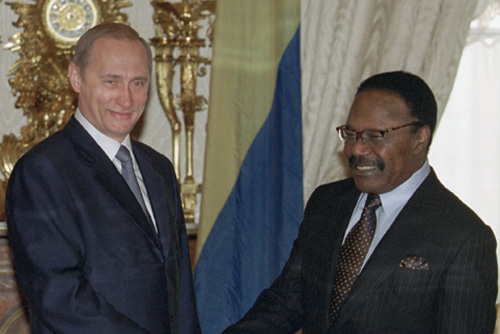
Gabon's relations with France were central to Omar Bongo's international policy, falling within the framework of Françafrique, a term describing France's strong influence over its former African colonies. A French journalist once described Gabon as an "extreme case, verging on caricature, of neocolonialism." Bongo himself famously stated, "Gabon without France is like a car with no driver. France without Gabon is like a car with no fuel..." This symbiotic relationship was fueled by Gabon's rich natural resources, including oil, a significant portion of the world's known uranium (which supplied France's nuclear weapons program), and substantial deposits of iron, manganese, and timber.
The ties were deeply informal, fostered through networks involving figures like Jacques Foccart (de Gaulle's advisor on African affairs), the oil company Elf Aquitaine, diplomat Maurice Delauney, intelligence officer Maurice Robert, and SAC militia leader Pierre Debizet. France's support for Bongo was evident early on: in 1964, when a coup attempt led to M'ba and Bongo's abduction, French paratroopers intervened to restore them to power. Bongo's appointment as Vice-President in 1966 was effectively sanctioned by de Gaulle himself in Paris.
French financial aid to Gabon was substantial. In 1988, the New York Times reported that French aid amounted to 360.00 M USD, subsidizing a third of Gabon's budget, extending low-interest trade loans, paying the salaries of 170 French advisors and 350 French teachers, and providing scholarships for Gabonese students in France. Controversially, 2.60 M USD of this aid was also reportedly used for the interior decoration of President Bongo's personal DC-8 jet.
In 1990, during widespread pro-democracy protests in Gabon, France used Opération Requin to deploy additional troops, reinforcing its permanent military base in Gabon and helping Bongo maintain power. Similarly, after the contentious 1993 multi-party presidential elections plunged Gabon to the brink of civil war, Paris hosted talks between Bongo and the opposition, leading to the Paris Accords that restored calm.
Bongo and his family were known for their lavish lifestyle in France. Transparency International estimated they possessed 39 luxurious properties, 70 bank accounts, and at least 9 luxury vehicles worth about 2.00 M USD. French President Valéry Giscard d'Estaing alleged that Bongo helped finance Jacques Chirac's 1981 presidential campaign, and Socialist parliamentarian André Vallini claimed Bongo bankrolled numerous French electoral campaigns across the political spectrum. Political analyst Nicholas Shaxson described Gabon's oil industry under Bongo as a source of "offshore slush funds" used by French political parties for secret financing and as bribes to support French commercial bids globally. In 2008, French President Nicolas Sarkozy even demoted a minister who criticized the "squandering of public funds" by some African regimes, including Bongo's, illustrating the sensitivity of these financial ties.
In his final months, Bongo was engaged in a significant dispute with France over a French inquiry into his wealth. A French court's decision in February 2009 to freeze his bank accounts prompted his government to accuse France of a "campaign to destabilize" Gabon. After Bongo's death, President Sarkozy expressed "sadness and emotion," pledging France's loyalty to its "long relationship of friendship" with Gabon, referring to Bongo as "a great and loyal friend of France" and a "grand figure of Africa." Following the 2007 complaint by NGOs Survie and Sherpa, parts of the Bongo family's real estate and other assets in France have been seized through biens mal acquis (ill-gotten gains) rulings.
4. Governance and Leadership Style
Omar Bongo's long presidency was characterized by a distinct leadership approach, the exploitation of Gabon's vast resources, and a mixed record on human rights and social development.
4.1. Leadership Style
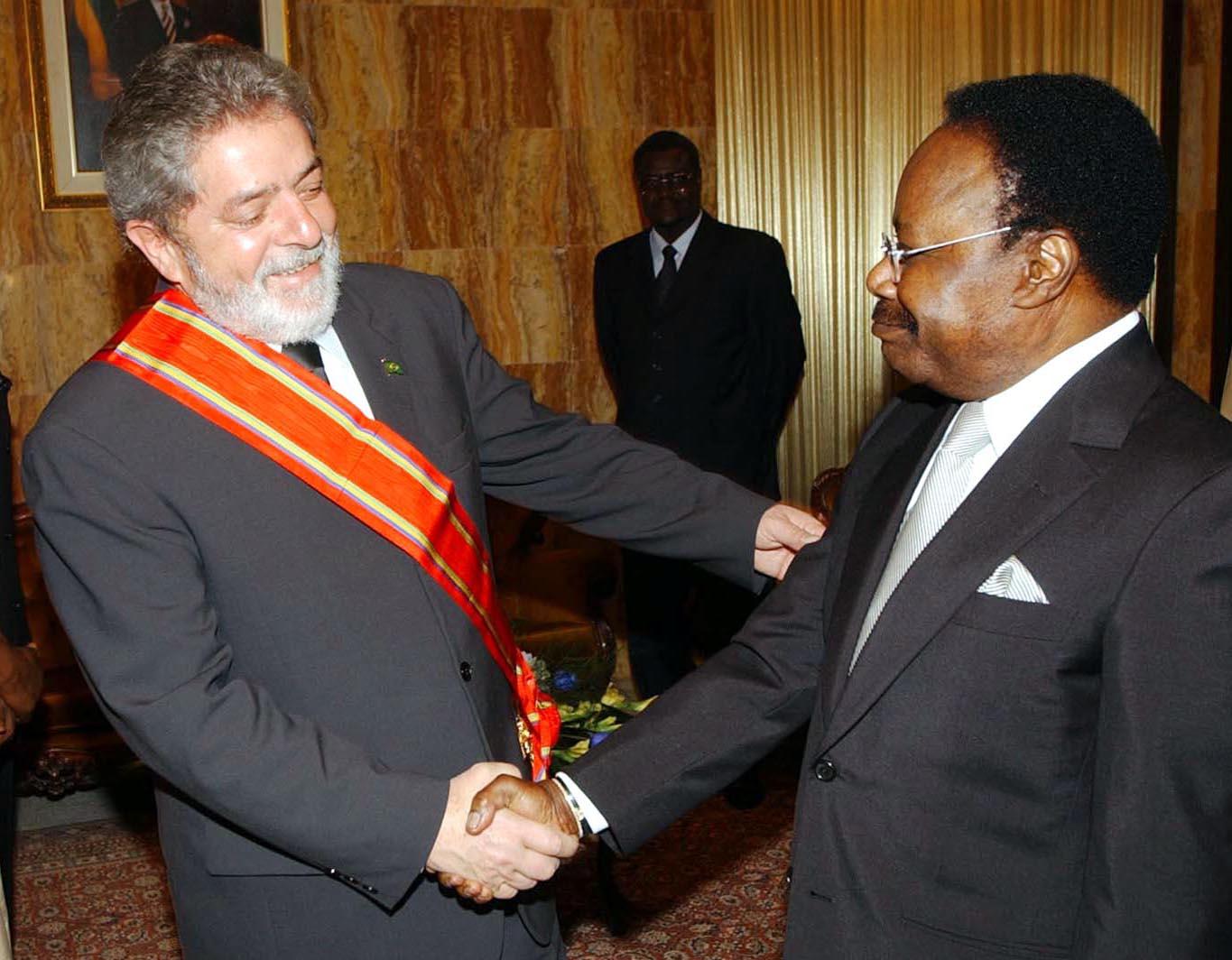
Omar Bongo was often described as an "African Big Man" ruler, a charismatic and dapper figure who conversed in flawless French. His diminutive height, attributed to his minority Bateke ethnic group, was often offset by raised platform shoes, but his political stature in Gabon and Africa was immense. He ruled shrewdly for nearly 42 years, cementing his authority through three primary pillars: unwavering French support, revenues from Gabon's substantial oil reserves (estimated at 2.5 billion barrels), and his exceptional political acumen.
Bongo's leadership was authoritarian, yet it was also pragmatic and centered on personal rule and extensive patronage networks. He cultivated a system where he carefully allowed just enough oil money to "trickle down" to the general population of 1.4 million, thereby averting mass unrest. He funded a bloated civil service, ensuring that state wealth was distributed widely enough to keep most citizens fed and clothed. While some basic infrastructure was developed in Libreville, Bongo controversially prioritized the construction of the 4.00 B USD Trans-Gabon Railway deep into the forested interior over a more extensive road network. Despite rich soil and a tropical climate, agricultural production in Gabon remained minimal, with most fruits, vegetables, and even milk imported. This reliance on state-sector jobs discouraged many Gabonese from seeking work outside the government, leaving manual labor largely to immigrants.
Bongo's political genius lay in his ability to manipulate the self-interest of others. He had no overarching ideology beyond his own self-interest, but he understood how to use the nation's oil wealth to his advantage. He skillfully co-opted or "bought off" opposition figures rather than outright crushing them, offering them modest shares of the nation's oil wealth or high-ranking government posts. This strategy proved highly effective, allowing him to comfortably extend his political dominance for decades. For example, after his controversial victory in the 1993 multi-party elections, which nearly led to civil war, Bongo engaged in talks with the opposition, resulting in the Paris Agreement. Similarly, following the disputed 1998 elections, he met with critics to discuss electoral reforms, and after the PDG's landslide victory in the 2001 legislative elections, he offered government posts to influential opposition members, with some, like Father Paul Mba Abessole, accepting for the sake of "friendly democracy." Even a prominent opposition leader like Pierre Mamboundou, who initially boycotted elections and rejected ministerial offers, eventually ceased public criticisms of Bongo, reportedly after the president pledged 21.50 M USD for the development of Mamboundou's constituency. As his rule progressed, Bongo increasingly relied on his close family members, with his son Ali Bongo Ondimba serving as Minister of Defense and his daughter Pascaline Bongo Ondimba as head of the presidential administration.
On the international stage, Bongo projected an image as a mediator, actively engaging in efforts to resolve crises in the Central African Republic, Republic of the Congo, Burundi, and the Democratic Republic of the Congo. In 1986, he received the Dag Hammarskjöld Peace Prize for his role in resolving the Chad-Libya border conflict, boosting his international standing. Domestically, his reign was popular among many Gabonese who valued the peace and stability it guaranteed, a rare achievement in a region often plagued by instability and conflict. Gabon under Bongo was noted for never experiencing a coup or civil war. Despite the immense oil revenues, political scientist Thomas Atenga criticized Gabon as a "rentier state" driven by "predation of resources for the benefit of its ruling class," leading to a parasitic capitalism that did little to improve the living conditions of the general population. Bongo was also known for his self-aggrandizement, with numerous national institutions and his hometown of Lewai renamed in his honor, such as Omar Bongo University, Bongo Airport, and Bongoville. He also showed some environmental commitment, designating 10% of Gabon's land as national parks in 2002, pledging to protect them from logging, mining, hunting, or farming. In 2000, he resolved a student strike by providing 1.35 M USD for computers and books, demonstrating his pragmatic approach to maintaining order.
4.2. Economic Policies and Social Impact
Under Omar Bongo's presidency, Gabon's economy was almost entirely dominated by its vast oil reserves. This resource wealth led to one of the highest per capita GDPs in Africa, yet the benefits were largely concentrated among Bongo, his family, and local elites. Critics, such as French green politician Eva Joly, argued that despite immense oil revenue, Gabon only built about 3.1 mile (5 km) of freeway per year and maintained one of the world's highest infant mortality rates by the time of Bongo's death in 2009. This demonstrated a significant disconnect between national wealth and the well-being of the general population.
The economic policies fostered a "rentier state" where the government's primary income came from resource extraction rather than diversified production. While this allowed for a large civil service and some basic infrastructure development, it discouraged self-sufficiency and private sector growth. Most manual labor was performed by immigrants, and essential goods like food were often imported, despite Gabon's fertile land. This reliance on oil created a parasitic capitalism, funneling wealth to the ruling class without substantially improving the living conditions of ordinary Gabonese citizens.
4.3. Human Rights and Freedoms
Omar Bongo's long rule was consistently marred by criticisms regarding human rights and freedoms. Press freedom was severely curtailed throughout his regime, which routinely banned news outlets that were critical of Bongo or his inner circle. This suppression of independent media stifled dissent and controlled the flow of information to the public.
Furthermore, Bongo was suspected of involvement in assassinations of political opponents and critics. Notable cases include the deaths of Ndouna Dépénaud, Joseph Rendjambé, and Robert Luong (in France). Joseph Rendjambé, a prominent opposition leader, was found dead in a hotel in 1990, reportedly poisoned, an event that sparked widespread rioting. These allegations contributed to a climate of fear and limited political space for genuine opposition. The overall human rights record during his presidency was characterized by a lack of political openness and the suppression of fundamental freedoms, reinforcing the authoritarian nature of his rule despite the official transition to multi-party politics.
5. Allegations of Corruption and Wealth
Omar Bongo was widely considered one of the wealthiest heads of state in the world, with his vast fortune primarily attributed to Gabon's oil revenues and alleged widespread political corruption and illicit enrichment.
In 1999, a United States Senate Permanent Subcommittee on Investigations report on Citibank estimated that Bongo held 130.00 M USD in personal bank accounts with the institution, funds which the report stated were "sourced in the public finances of Gabon," indicating potential misappropriation. Further scrutiny arose in 2005 when a United States Senate Indian Affairs Committee investigation into lobbyist Jack Abramoff's fundraising activities revealed that Abramoff had offered to arrange a meeting between Bongo and U.S. President George W. Bush for 9.00 M USD. Though the direct exchange of funds for the meeting remained unproven, President Bush did meet with Bongo in the Oval Office ten months later.
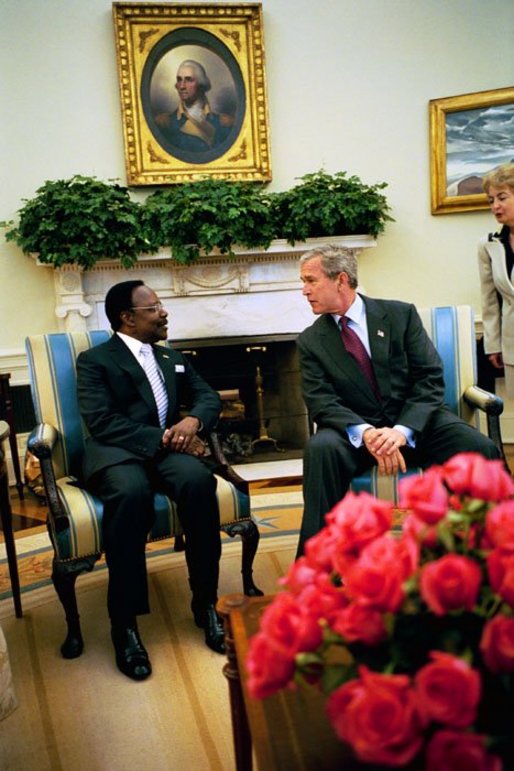
The scale of Bongo's family wealth and extravagant spending drew international attention. In 2007, his former daughter-in-law, Inge Lynn Collins Bongo, second wife of his son Ali Bongo, appeared on the U.S. reality show Really Rich Real Estate attempting to purchase a 25.00 M USD mansion in Malibu, California, sparking public outcry.
Bongo was implicated in French criminal inquiries into hundreds of millions of euros in illicit payments by Elf Aquitaine, the former French state-owned oil group. One Elf representative testified that the company provided 50.00 M EUR per year to Bongo for the exploitation of Gabon's oil fields. Since June 2007, French magistrates have investigated Bongo and other African leaders, including President Denis Sassou Nguesso of the Republic of the Congo, Blaise Compaoré of Burkina Faso, Teodoro Obiang Nguema Mbasogo of Equatorial Guinea, and José Eduardo dos Santos of Angola, following complaints by French NGOs Survie and Sherpa. These complaints alleged that the leaders used millions of pounds of embezzled public funds to acquire lavish properties in France. All leaders denied wrongdoing.
In a detailed report on June 20, 2008, The Sunday Times (UK) revealed that a mansion worth 15.00 M GBP in a prestigious Parisian district was the latest of 33 luxury properties acquired in France by Bongo. The French judicial investigation found that Bongo, his wife Edith, and two of his children, Omar (13) and Yacine (16), along with a nephew, were partners in a Luxembourg-based property company that bought the 21.53 K ft2 Paris home. Bongo's portfolio included nine other properties in Paris, four on the exclusive Avenue Foch, and seven in Nice, including four villas. His wife, Edith, owned two flats near the Eiffel Tower and another property in Nice. The investigation, led by the French anti-fraud agency OCRGDF, also uncovered a fleet of luxury cars. His wife Edith used a check from an account in the name of "Prairie du Gabon en France," part of the Gabonese treasury, to buy a 308.82 K GBP Maybach in 2004. His daughter Pascaline used a check from the same account for a partial payment of 29.50 K GBP towards a 60.00 K GBP Mercedes two years later. Bongo himself bought a Ferrari 612 Scaglietti F1 for 153.00 K GBP in October 2004, and his son Ali acquired a Ferrari 456 M GT for 156.00 K GBP in June 2001. A 1997 U.S. Senate report stated his family spent 55.00 M GBP annually. An executive in a separate French investigation into corruption at Elf Aquitaine testified that the company paid Bongo 40.00 M GBP annually via Swiss bank accounts in exchange for oil exploitation rights, an allegation Bongo denied. The latest inquiry followed a lawsuit accusing Bongo and two other African leaders of looting public funds to finance their purchases, with the lawsuit stating, "Whatever the merits and qualifications of these leaders, no one can seriously believe that these assets were paid for out of their salaries."
In 2009, Bongo's final months were marked by a major dispute with France over the ongoing inquiry. A French court's decision in February 2009 to freeze his bank accounts intensified the conflict, leading his government to accuse France of a "campaign to destabilize" the country. Following the 2007 complaints by Sherpa and Survie, some of the Bongo family's real estate and other assets in France have been seized through biens mal acquis rulings, highlighting the long-term legal consequences of these allegations.
6. Personal Life
Omar Bongo's personal life, including his multiple marriages, numerous children, and religious conversion, intertwined significantly with his public and political persona, contributing to his extensive influence and dynastic ambitions.
6.1. Family and Marriages
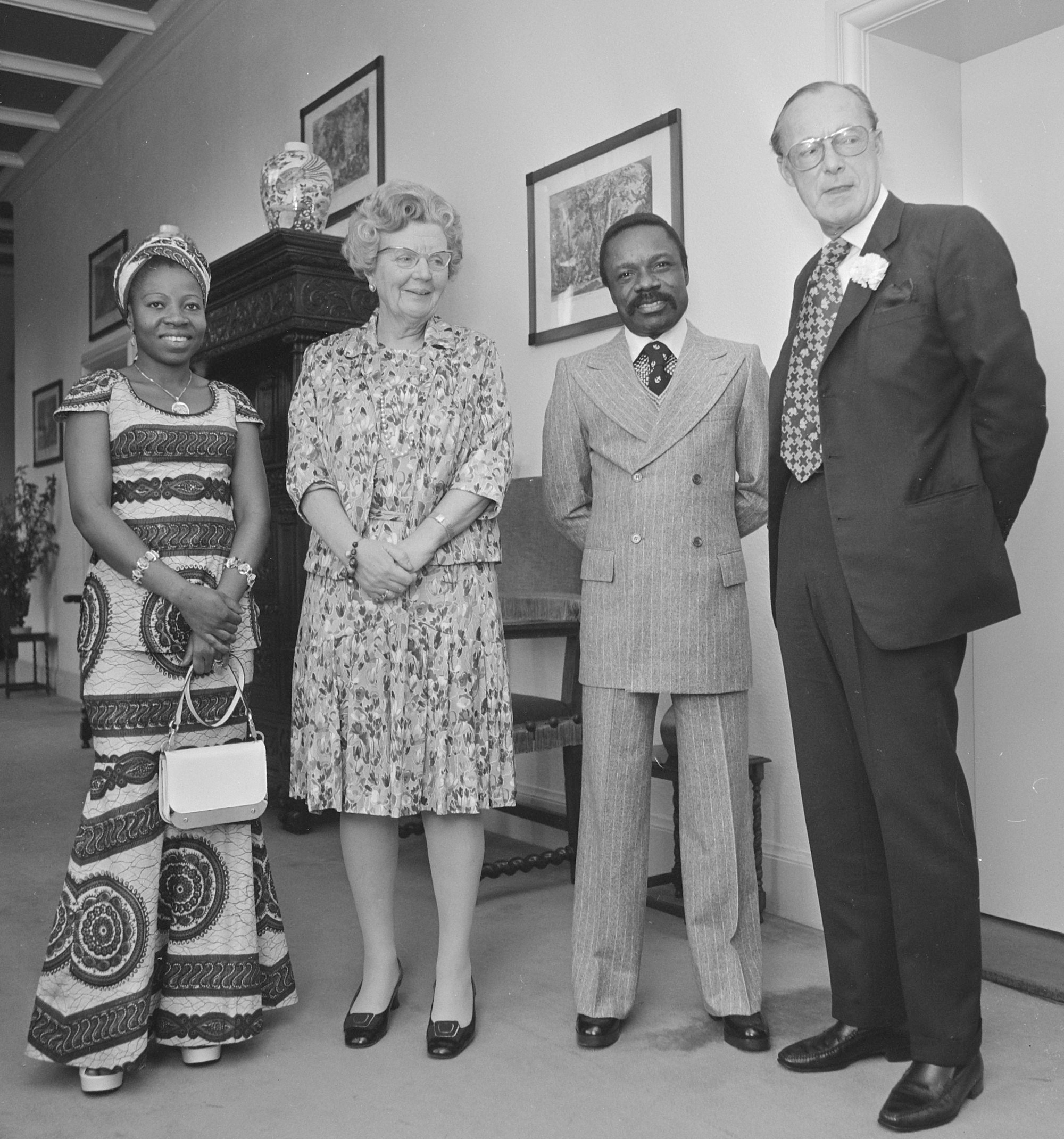
Omar Bongo had more than 30 children with his wives and other women, reflecting a large and complex family structure. His first marriage was to Louise Mouyabi-Moukala, with whom he had a daughter, Pascaline Bongo Ondimba, born in Franceville in 1957. Pascaline went on to hold significant political roles, serving as Gabon's Foreign Minister and later as Director of the Presidential Cabinet, demonstrating the strong presence of his family members in Gabonese politics.
His second marriage was to Marie Joséphine Kama, who later became known as Joséphine Bongo. Following their divorce in 1987, she launched a successful music career under the name Patience Dabany. They had a son, Alain Bernard Bongo, and a daughter, Albertine Amissa Bongo. Alain Bernard Bongo, born in Brazzaville in 1959, later known as Ali Bongo Ondimba, followed in his father's political footsteps. He served as Foreign Minister from 1989 to 1992, then as Defense Minister from 1999 to 2009, and was eventually elected President in August 2009, succeeding his father.
In 1989, Bongo married Edith Lucie Sassou-Nguesso, who was nearly 30 years his junior. She was the daughter of Congolese President Denis Sassou-Nguesso, further cementing political alliances through marriage. Edith Lucie was a trained pediatrician known for her commitment to fighting AIDS, and she bore Bongo two children. She died on March 14, 2009, in Rabat, Morocco, at the age of 45, after undergoing treatment for several months. The official statement did not specify the cause or nature of her illness, and she had not appeared publicly for approximately three years before her death. She was buried on March 22, 2009, in the family cemetery in Edou, her native town in the Republic of the Congo.
Bongo's personal life was not without scandal. In 2004, The New York Times reported on an investigation by Peru into claims that a 22-year-old Miss Peru America contestant, Ivette Santa Maria, was lured to Gabon to become the lover of the then 67-year-old president. She alleged that after refusing his advances, she was stranded for nearly two weeks in Gabon without money, before international women's groups intervened. A spokesman for Bongo stated he was unaware of the allegations.
6.2. Religious Conversion
Omar Bongo converted from Christianity to Islam and adopted the name Omar during a visit to Libya in 1973. At the time of his conversion, Muslims constituted a tiny minority of Gabon's native population. Following his conversion, the number of Muslims in Gabon grew, though they continued to remain a small minority.
7. Illness and Death
The final period of Omar Bongo's life was marked by health struggles, ultimately leading to his death and a period of national mourning and political transition in Gabon.
7.1. Illness and Death
On May 7, 2009, the Gabonese Government announced that President Bongo had temporarily suspended his official duties to mourn his recently deceased wife and rest in Spain. However, international media soon reported that he was gravely ill, undergoing treatment for cancer in a hospital in Barcelona, Spain. The Gabonese government initially maintained that he was in Spain for a brief period of rest following the "intense emotional shock" of his wife's death, but eventually acknowledged that he was in a Spanish clinic for a "medical check-up."
On June 7, 2009, unconfirmed reports from French media, citing sources close to the French government, stated that Bongo had died in Spain from complications related to advanced cancer. The Government of Gabon initially denied these reports, which had been widely disseminated by numerous news sources, insisting that the President was well. However, his death was officially confirmed by Gabonese Prime Minister Jean Eyeghe Ndong in a written statement on June 8, 2009, indicating that Bongo had died of a heart attack shortly before 12:30 GMT.
7.2. State Funeral and Succession
Following his death, Omar Bongo's body was flown back to Gabon, where it lay in state for five days, allowing thousands of citizens to pay their respects. A grand state funeral was held on June 16, 2009, in Libreville. The ceremony was attended by nearly two dozen African heads of state, including several long-serving leaders and strongmen from across the continent. Notably, French President Nicolas Sarkozy and his predecessor Jacques Chirac were the only Western heads of state to attend, underscoring the enduring significance of Gabon's relationship with France.
After the state funeral, Bongo's body was transported to Franceville, the main town in the southeastern province of Haut-Ogooué, his birthplace. He was laid to rest in a private family burial on June 18, 2009. Immediately following his death, the Gabonese government closed international airports and land and air borders, while security forces were deployed around government buildings and power installations in Libreville to maintain order. In the political transition that followed, Rose Francine Rogombé served as interim president, and later, his son, Ali Bongo Ondimba, who had long held key ministerial responsibilities under his father, was elected to succeed him as President in August 2009, continuing the Bongo family's political legacy. However, Ali Bongo was himself overthrown in a 2023 coup d'état by his cousin, Brice Oligui Nguema, though the broader Bongo family ultimately remained influential.
8. Legacy and Assessment
Omar Bongo's presidency left a complex and often contradictory legacy, marked by both stability and significant criticisms regarding governance, human rights, and equitable development.
8.1. Historical Assessment
Bongo's rule is historically assessed as a period of remarkable political longevity and stability in Gabon. Under his leadership, Gabon avoided the coups and civil wars that plagued many of its neighbors, an achievement that contributed to his popularity among many Gabonese. He skillfully navigated domestic and international politics, often leveraging Gabon's oil wealth and close ties with France to maintain his grip on power. He was a master of political maneuvering, known for his ability to co-opt opponents and prevent the emergence of a unified opposition, often by offering them positions or financial incentives.
However, this stability came at a significant cost to democratic development and human rights. Critics consistently pointed to his authoritarian leadership, the curtailment of press freedom, suppression of political dissent, and allegations of involvement in assassinations of opposition figures. His commitment to a one-party state for decades, and subsequent constitutional changes to allow unlimited re-election, demonstrated his intent to rule for life, drawing strong condemnation from human rights and pro-democracy organizations. His administration was also heavily criticized for widespread corruption and the accumulation of vast personal wealth by Bongo and his family, which overshadowed any contributions to genuine national development.
8.2. Impact on Gabon
The long-term socio-economic and political consequences of Omar Bongo's decades-long presidency on Gabon are profound and continue to shape the nation. Economically, Gabon became heavily reliant on oil exports, transforming into a rentier state. While this brought a high per capita GDP for some time, the benefits were not equitably distributed. Critics argue that the vast oil wealth primarily served to enrich Bongo, his family, and a small elite, rather than being invested in broad-based development, education, healthcare, or diversified industries. The country saw limited infrastructure development (such as very few new roads) and maintained high rates of social inequality and infant mortality, despite its resource riches. This fostered a culture of dependence on the state, with many Gabonese preferring civil service jobs funded by petrodollars over private sector employment.
Politically, Bongo's rule entrenched a system characterized by patronage, nepotism, and a weak institutional framework. His strategic co-optation of the opposition prevented the development of a robust multi-party democracy. While he introduced multi-party politics in 1990, the electoral processes that followed were often controversial and criticized for lacking transparency, ensuring his continued dominance. The dynastic succession of his son, Ali Bongo Ondimba, further underscored the centralized and personal nature of power under the Bongo family. Although Ali Bongo was later overthrown in 2023, the enduring influence of the Bongo family and its networks highlights the lasting political structures shaped by Omar Bongo's long rule. His legacy in Gabon is therefore seen as a mixed one: a period of relative peace and stability, but also one of missed opportunities for equitable development, suppressed democratic freedoms, and institutionalized corruption.
9. Honours and Awards
Omar Bongo received numerous national and international honours and decorations throughout his career, reflecting his long tenure and diplomatic activities on the global stage.
- National Honours (Gabon):**
- Grand Cross of the Order of the Equatorial Star
- Grand Cross of the National Order of Merit
- Foreign Honours:**
- Angola: Recipient of the Order of Agostinho Neto (1992)
- France: Grand Cross of the National Order of the Legion of Honour
- Italy: Knight Grand Cross with Collar of the Order of Merit of the Italian Republic (1973)
- Philippines: Grand Collar of the Order of Sikatuna
- Portugal: Grand Collar of the Order of Prince Henry (2001)
- South Korea: Grand Order of Mugunghwa (1975)
- United Kingdom: Honorary Knight Grand Cross of the Order of St Michael and St George
- Yugoslavia: Order of the Yugoslav Great Star
- In 1986, Bongo received the Dag Hammarskjöld Peace Prize for his efforts to resolve the Chad-Libya border conflict.
10. In Popular Culture
Omar Bongo has been referenced in popular culture, notably in film. He was mentioned in Robert Altman's 1983 offbeat comedy O.C. and Stiggs. In the film, the irreverent title characters, who express admiration for Bongo, phone the seemingly amused Gabonese leader to describe their "utterly monstrous, mind-roasting summer." The main characters also hoist the flag of Gabon from the antenna of their "monster car."
In February 2001, then-Norwegian Foreign Minister Thorbjørn Jagland humorously referred to Bongo as "Bongo from Congo" on national television after Bongo's visit to Norway, stating that everyone at the Ministry of Foreign Affairs kept telling him he was about to meet "Bongo from Congo."